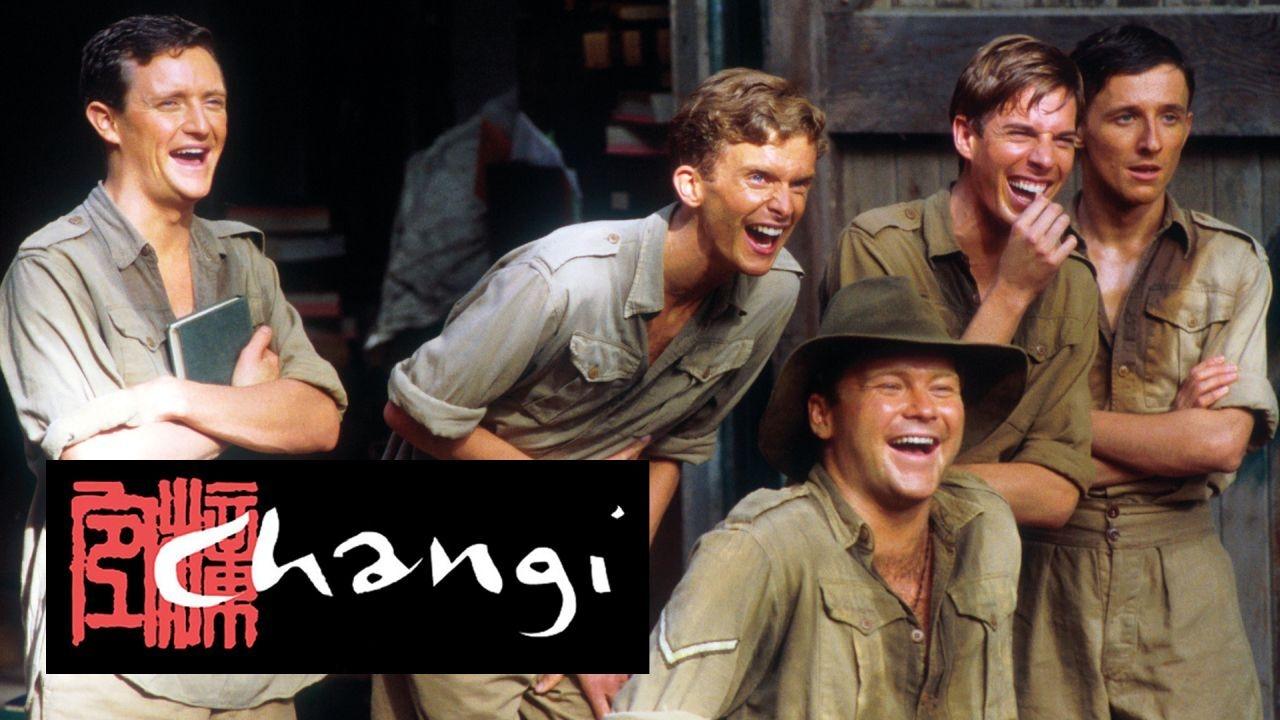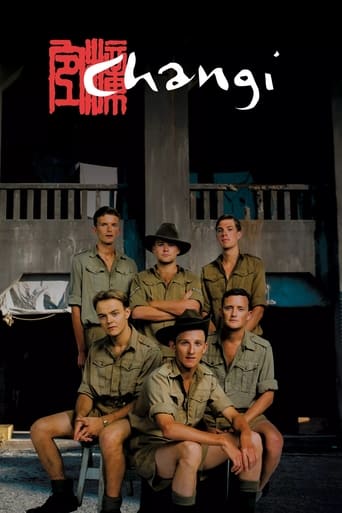

I was forced to watch 'Changi' last year in year 10 Australian History. Looking around the class room, both classes, all 40 students were nearly asleep, all 40 heads on the table whispering to the person next to them. I refuse to believe that because I am only 16, that my opinion doesn't count, having studied world war two, I not only felt embarrassed and ashamed watching this Australian piece of trash television. I was out of my mind at the appalling effort this mini series applied in the usage of film elements. The acting was poor, the screenplay was very inaccurate and the score was dreadful. Please, do not watch this film, it is bias and very racists (to the Japans).
... View MoreA great example of sloppy writing and no research. As another reviewer has said " A cut and paste of 'Bridge on the River Kwai','Hogans Heroes' and the 'Singing Detective'. The writer, John Doyle has admitted he didn't ask for and never got any technical assistance. when the series went to air old Diggers who were ex POWs said "He made it look like we had three years at the Changi Hilton, with an excursion to a railway site". Most glaring errors were 1) The lads saluted a corporal.. Not even in the Italian Army does anyone salute a corp. 2) People saluted officers when the weren't wearing hats.. One of the great advantages of the Australian Army is and was if you haven't got your hat on you don't need to salute and officer. Doyle has seen too many American movies where you can salute an officer when you are not wearing a hat. 3)Notice how the slouch hats are always turned up?..Believe me, first opportunity the brim is turned down all around! Finally, not all Australians are half witted yobbos. Some of us have read a book and had some form of education. The series is flawed, but is almost close to the way the national spirit used to be. Sadly, Aussies aren't like this any more. We are a pack of wimps that take our cell phones to war with us so we can call our girl friends.
... View MoreWhen I heard there was to be an ABC [Australian Broadcasting Corporation] mini-series based on life in Changi [WWII POW] camp... with a focus on "elements of comedy", I was deeply sceptical and somewhat critical.My father had served in the second world war. Such was the barbarity of the Japanese, he was able to talk about the horrors in and around Labuan (where he was stationed), until only quite recently. Along with my father, I had been awarded the fortune of knowing many great men (of stronger character and spirit than I shall ever have), who had witnessed acts of unspeakable barbarity at the hands of the Empire of Japan, and had never completely recovered. The name 'Changi' is destined to conjure horrific images for ages to come...But upon viewing, I was highly impressed with the cast, the characters and the complex plot-lines of this wonderful series. I now regard 'Changi' as the highlight of my week, (bear in mind, I have viewed only three episodes so far... I hope the remaining episodes adhere to the standards set by the first three).The black humour works uncannily well (however, the flatulence jokes are a little overdone), and while much of the horror has been suppressed, the series comes quite close in relaying the undaunted spirit of the survivors who were able to later continue with their lives in spite of the inhibiting memories.The 'flashback' format of this series will be difficult for some to follow,but I can not think of no better way to do adequate justice to the men who suffered deep emotional scarring proceeding internment... when painfully suppressed experiences are remembered, sometimes years after the horror.One of the darkest chapters of the Second World War, the 20th century, and, (I would go so far as to say), in the history of mankind, is being relayed to a new generation through this series, and I hope it serves to relay the overwhelming adversity borne by the wartime generation.Proceeding 'Changi', I don't think I shall ever be able to listen to the poignant tune 'on the road to Gundagai' in the same way again. Tune in...
... View More"Changi" is an Australian comedy/drama set in the World War 2 Japanese prisoner of war camp of that name. The story cuts between past events, and the present day, when the aged veterans plan a reunion. This is a much publicised and controversial miniseries, here in Australia. The budget ran over ($6.5 million Aust. dollars); historians and veterans criticised it's authenticity; and critics pilloried the uneasy mix of comedy and drama (shades of "Pearl Harbor"). Series writer John Doyle (half of the successful Roy & H.G. comedy team), has tried to defend himself with comments about "the characters are composites of actual people"; "the troops used comedy to cope with the situation"; "it's only based on actual events"; "one of our actors was actually there" etc. I don't have a problem with any of these points. Many superb fictional and factual dramas have come out of the Japanese P.O.W. camp experience: "King Rat", "Tenko", "Merry Christmas Mr. Lawrence", "Bridge on the River Kwai", "Paradise Road", "Empire of the Sun", "Blood Oath", and "A Town Like Alice". Black comedy has often been used successfully in P.O.W dramas: "Life is Beautiful", "The Great Escape", "Seven Beauties", "Stalag 17", "The Colditz Story", and even "Hogan's Heroes". So why is "Changi" a monumental failure? - the acting in "Changi" is uniformly excellent, the music and cinematography is good - it is the writing and direction that have let it down. Every scene seemed to give me waves of deja vu. When Anthony Hayes is made to stand in the blazing sun, I thought "Didn't I see Alec Guinness do this in "Bridge on the River Kwai"?". The sudden flashes into surreal song & dance brought back Dennis Potter's "Singing Detective", but without the finesse. This borrowing happened so often, it smacked of lazy writing by cut and paste, rather than homage. The constant intercutting between the past and present stories left me unable to concentrate on either. Flash forward and flash back can be a useful tool - here it left me distanced from characters, where intensity was called for. The "Ausiness" is overdone - every conversation seemed to include "stone the bloody crows" & such, that I was saying "I get the point, I know they're Aussies". Cultural stereotyping extended to the British and Japanese too -sadistic young Japanese officer; uptight British officer; wiser Japanese commandant; fun-loving, rascally Aussies etc. I thought I was watching "Hogan's Heroes on the River Kwai". After 3 episodes I'm tuning out.
... View More